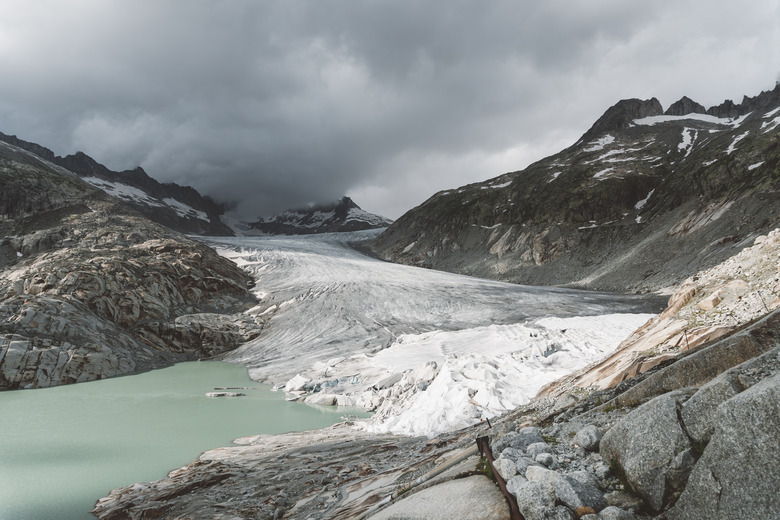Animals That Live On Glaciers And Icebergs
Glaciers are year-round bodies of ice, ranging in size from comparatively small alpine glaciers to the huge ice sheets of polar latitudes. Icebergs are large floating islands of freshwater ice, broken off from glaciers. They are common to the seas around each pole, and may or may not persist for multiple years. Icebergs play a larger role in the lives of animals than glaciers, as icebergs are more immediately surrounded by the nutrients necessary for life.
Glacier Animals
Glacier Animals
Glaciers are fairly devoid of nutrients or conditions that might support life. While birds and large animals such as polar bears might visit a glacier, only a few small, specialized animal are capable of truly living on these massive blocks of snow and ice.
These tiny animals include glacial midges, snow fleas, glacial copepods, rotifers and ice worms. These animals are preyed upon by larger animals that occasionally pay a visit to their glacial home. For example, ice worms are preyed upon by snow buntings and other birds.
Iceberg Polar Bears
Iceberg Polar Bears
Polar bears spend much of their time hunting seals in Arctic waters, so it makes sense that they would also spend much of their time living on icebergs. As many as 20 polar bears have been observed living on an iceberg off the Arctic Canadian coast.
Polar bear expert and biologist Steven Amstrup stated that this was the first time bears were spotted living in large numbers on an iceberg out at sea. The bears may have found refuge on icebergs as a consequence of decades of being hunted by humans on dry land.
Ice Floe Penguins
Ice Floe Penguins
Adélie penguins are having to adjust their behaviors in response to recently changing sea ice conditions, according to a 2014 study conducted by a team of French, American, and South African researchers. Sea ice is different from glacier ice: sea ice is frozen sea water and glacier ice is frozen fresh water from precipitation.
Like icebergs and glacier ice, pieces of fast sea ice can break off and become floating chunks of ice; these are called ice floes. Adélie penguins rely on all manner of ice floes for foraging, migrating, molting and resting.
These penguins prey on the species that live on the underside of ice floes, such as krill. The penguins also prey on the predators of these species, such as Antarctic silverfish. The study reveals that the penguins are, fairly successfully, changing their habits due to changing sea ice conditions.
Iceberg Seals
Iceberg Seals
Icebergs are also highly important to Arctic seals. Harbor seals are much safer from predators when they haul out, or take a break from the water, on icebergs as opposed to on land.
In addition to using them as a refuge from predators, harbor seals also use icebergs for giving birth. Weddel seals living off the coast of Antarctica have been found to be reliant on sea ice, and therefore affected by changing sea ice patterns in recent years.
Impacts of Climate Change
Impacts of Climate Change
The warming global temperatures associated with human-caused climate change are having dramatic impacts on the planet's ice environments, melting glaciers in many mountain ranges and changing sea ice and ice sheet patterns up around the poles.
The Arctic has been warming twice as quickly as the rest of the planet, and sea ice has declined by 13 percent every decade since 1979. This has great repercussions for ice-dependent species such as polar bears, which rely on sea ice to hunt and travel; declining sea ice overall and shorter windows for the formation of seasonal ice are resulting in greatly reduced habitat for the "ice bear."
In the Antarctic, meanwhile, modeling suggests that current patterns of sea-ice decline may doom most colonies of emperor penguins to extinction by 2100, due to loss of pack-ice and shelf-ice breeding habitat as well as decreases in the krill the bird feeds upon.
References
- BBC News: Polar Bear Sanctuary on Iceberg
- PLOS ONE: Antarctic Climate Change: Extreme Events Disrupt Plastic Phenotypic Response in Adélie Penguins
- Alaska Department of Fish and Game: Harbor Seal Research
- NASA Earth Observatory: Polar Bears Struggle as Sea Ice Declines
- Science Daily: Emperor Penguins Increasingly Threatened by Climate Change
Cite This Article
MLA
Smith, Brett. "Animals That Live On Glaciers And Icebergs" sciencing.com, https://www.sciencing.com/animals-live-glaciers-icebergs-8265816/. 30 September 2021.
APA
Smith, Brett. (2021, September 30). Animals That Live On Glaciers And Icebergs. sciencing.com. Retrieved from https://www.sciencing.com/animals-live-glaciers-icebergs-8265816/
Chicago
Smith, Brett. Animals That Live On Glaciers And Icebergs last modified March 24, 2022. https://www.sciencing.com/animals-live-glaciers-icebergs-8265816/
